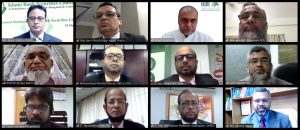Mostafa Kamal Majumder
Nobel Laureate Prof. Muhammad Yunus has called for redesigning the economy to redesign the world. His short write-up published in the news media on Monday has been received by readers across the globe with praise for his insights into the prevailing economic system and a prescription for switch over to a better self-sustaining order in which all people will have some entrepreneurial role in an atmosphere of equitable sharing of resources. And, he assures, the problem of unemployment will be done away with in the end.
One may interpret this as a move to give a theoretical framework to the concept of social business that the Nobel Laureate has been effectively promoting for the last several years not only in Bangladesh but also in many other countries of the world. This he seeks to achieve by adding moral value to the seeking of profit in business not merely for oneself but also for the society as a whole.In the words of Muhammad Yunus, ‘Conventional business is personal- profit seeking business. The new business, which I am adding, is personal profit-forsaking business. It is a for-profit business, but personal-profit forsaking business. I call it social business — a non-dividend company to solve human problems. … After getting the investment money back all profit is ploughed back into the business to make it better and bigger. It stands between charity and conventional business. It is designed with the objectives of charity and carried out with the methodology of business, but delinked from personal profit-taking.’ He continues, ‘Capitalist system is about freedom to choose. Money is the sole source of happiness here. But when it comes to looking for happiness it gives no choice. By introducing social business, to make the world happy, we give people another choice. Now they can choose.’
This marks a transformation of the poor man’s banker who has worked to bring the poor out of the poverty trap and earned global recognition for his successful experiment, to a social engineer to create a society where each member would care for others. Thanks to his oriental background of sharing resources, pains and pleasures, sorrows and happiness in joint or extended families and where there has been a tradition of social response to disasters – social or natural – to help the hard-hit people overcome miseries, that has shaped his mental make-up which is different from the present purely individualistic tendencies in the developed countries of the West.
To achieve the objectives of social business he seeks to make use of his favourite tools – financial institutions of the poor , as opposed to those for the rich – to assist a half of the world population that control only one percent of world wealth to upgrade themselves as entrepreneurs to produce goods and services. Prof. Muhammad Yunus writes, ‘ There should be plenty of opportunity for each and every person to switch from being labour to being an entrepreneur. Social business can make it happen. Every person, at all stages of his life, should have two options, either to work for somebody, or be an entrepreneur.” To create these new types of entrepreneurs a new type of business education would be needed. ‘If we accept the concept of social business, business schools will be required to produce another category of graduates equipping them to become social-problem-fighters to bring an end to social problems through social businesses.’
From this point Muhammad Yunus aims to build an unemployment-free society. He says, ‘This problem of unemployment is not created by the unemployed people themselves. I have been insisting that all human beings are born entrepreneurs, not job-seekers. Education system should be aiming at enhancing their entrepreneurial capacities, not eliminate it, by making the students believe that getting a job is the ultimate goal of their lives.’ The Nobel Laureate’s dream – ‘We should make sure that the word ‘unemployment’ soon gets unemployed. When we build a new world we know for sure in that world the word ‘unemployment’ will not make sense to anybody. Nobody would be able to figure out how could a full blooded human being remain idle.’
The Nobel Laureate thus sets a lofty goal which can be compared with Karl Marx’s romantic dream of a ‘classless society’ that he thought would follow a long period of dictatorship of the proletariat under a socialist order. But that has not happened anywhere in the world. Prof. Muhammad Yunus deserves accolade for his faith in the limitless potential of man, and his urge to give a moral basis to profit seeking in business. The learned economist is definitely also aware of human frailties for which some people might not be able to perform like others. In other words care should be taken so that failures in social business happen the least. What the Nobel Laureate has professed may be taken as the ideal to be pursued through best practicable means?
(An experienced journalist, Mostafa Kamal Majumder is the editor of GreenWatch Dhaka)




